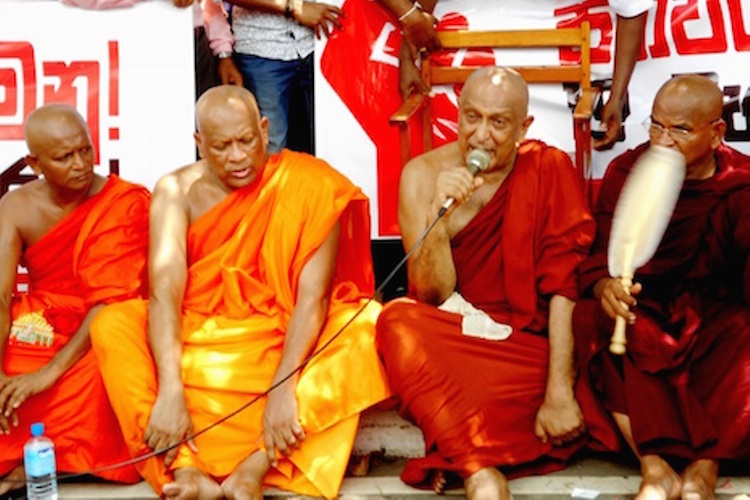Lines drawn as activists vow to abolish emergency powers but opponents fear it will embolden separatists

The late Ven. Maduluwawe Sobitha Thera holds a microphone at a demonstration in Colombo, Sri Lanka in this 2015 file photo. The mass demonstrations persuaded parliament to pass the 19th Amendment to the constitution, which would curtail the president’s executive powers. (Photo by Quintus Colombage/ucanews.com).
May 18, 2018
Abolishing Sri Lanka‘s executive presidency by approving a recently proposed 20th Amendment to the constitution would further divide the fragile country by empowering Tamil separatists, senior Buddhist monks said this month.
Hundreds of monks attended an annual meeting of the National Academic Buddhist Conference, known locally as Jathika Vidwath Sangha Sabh on May 3.
They were vocal in their opposition to calls to curtail presidential powers, which they claim could jeopardize Sri Lanka’s sovereignty by encouraging separatists, referring to elements within the Tamil community supportive of efforts to create a Tamil homeland on the island nation.
The Liberation Tigers of Tamil Eelam (LTTE) fought and lost for that ideal during the country’s civil war (1983 – 2009). Many Tamils fled abroad to Europe during the war where they formed several organizations supporting LTTE efforts in Sri Lanka.
The executive presidential system has been an important factor ensuring decision making during crisis situations such as the civil war.
Ven. Prof. Induragare Dhammarathana Thera, who is involved with several nationalist groups, believes the country needs a president with sweeping executive powers.
He said President Maithripala Sirisena, who serves as the executive head of state and commander-in-chief of the armed forces, and Prime Minister Ranil Wickremesinghe would be unwise to approve the 20th Amendment proposed Janatha Vimukthi Peramuna (JVP), a Marxist-Leninist party.
“It would be very dangerous to abolish the executive power,” he said.
Based on a model developed in the United Kingdom, the system of executive presidency was adopted decades ago by former British colonies including Sri Lanka, previously known as Ceylon.
It has generated much debate since it was inaugurated with the Westminster system of parliamentary democracy in 1978, when then-president J. R. Jayawardene helped draft a new constitution after winning a landslide victory in the 1977 election.
“Jayawardene used this victory to his own advantage and declared himself as the executive president,” said Father Reid Shelton Fernando, a university lecturer.
But while supporters see it as a bulwark against the potential breaking down of Sri Lanka’s fragile society, critics say it grants the head of the government too much power.

Civil rights groups organize mass demonstrations in 2015 urging parliament to amend the charter. (Photo by Quintus Colombage/ucanews.com)
The late Ven. Maduluwawe Sobitha Thera tried to get it abolished in 2012 by forming the National Movement for Social Justice (NMSJ).
He forwarded proposals urging the return to an earlier parliamentary system and suggested a road map to end the system of executive presidency.
Father Fernando, who is also a member of the NMSJ, said the late monk announced the campaign on his 73rd birthday. He blamed many of the ills hampering the nation’s development on this form of presidential rule.
“Instead of addressing the problems of the people and leading the country to further development, it fell subject to widespread corruption and total dictatorship, leaving the people in a state of helplessness,” Father Fernando said.
“People’s views weren’t respected at all. It was a one-man show in terms of decision-making concerning the welfare of the public.”
According to Father Fernando, every party candidate who has run for president since 1994 has promised to abolish the system.
Yet the victors have consistently forgotten their key pledge after the poll, he said, paving the way for abuses of power.
“This is why the NMSJ called to change the system in 2012,” he said.
“Since former president Mahinda Rajapaksa was defeated in 2015, Maithripala Sirisena has governed for three years,” he added.
“But later he made significant changes to the 19th Amendment by bringing in independent commissions.”
Passed in April 2015, and based on one of Siresena’s key campaign pledges, the amendment sought to dilute the powers of the government and was considered the most revolutionary reform to the charter in over 35 years.
Anura Kumara Dissanayake, leader of the JVP, said his party would stop at nothing to realize the 20th Amendment.
But getting it enshrined in the charter will require the approval of a two-thirds majority in parliament.
Sajith Kumara, who supports the government, said no Sri Lankan leader would clip their own wings by signing off on a piece of legislation that would weaken their power.
“This change has been promised at every election since 1994 and [ignoring it] is anti-democratic,” he said.
“But 6.2 million people voted for the government to abolish the executive presidency and Sirisena has promised he will honor that,” he added.
Some religious leaders are unhappy with the content of the proposed new constitution, spurring protests from Buddhist monks.
Even Cardinal Malcolm Ranjith of Colombo has opposed the draft.
